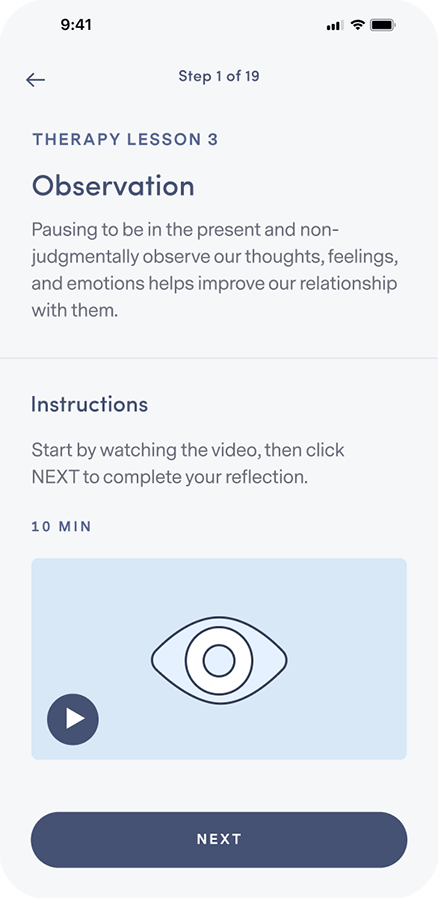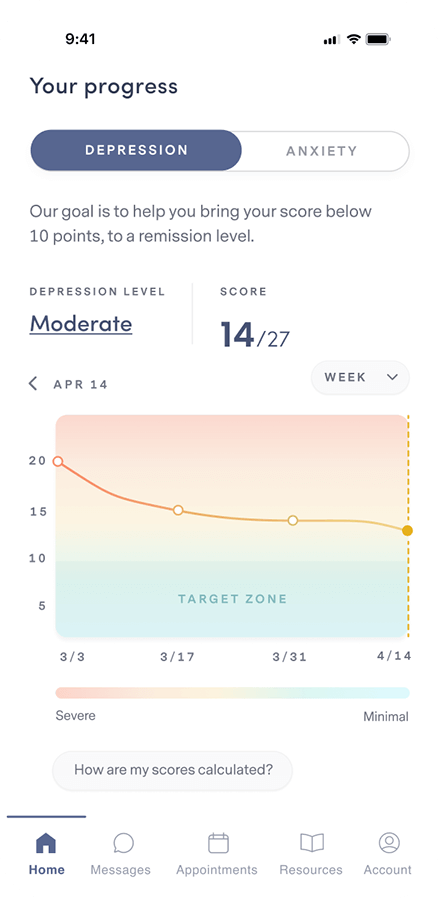HOW WE TREAT ANXIETY
Life-changing online care for generalized anxiety disorder
Our providers understand the challenges of anxiety, and have real-world experience helping people just like you.
Start with a free assessment
HOW WE TREAT ANXIETY
Our providers understand the challenges of anxiety, and have real-world experience helping people just like you.
Start with a free assessment
Our Care
Different people experience anxiety in different ways. That’s why our providers work 1:1 with you to personalize treatment to your unique needs.
When medication is necessary, our psychiatric providers analyze 100+ data points to determine the most tolerable and effective prescription for you.
Our program combines cognitive and behavioral therapy with independent skill practice—all of which have been clinically proven to work for a wide range of symptoms.
Mental Health condition
The feeling of anxiety can vary from person-to-person. For some, it can feel like random, intense spikes of panic. For others, it can feel like an all-consuming, underlying sense of dread that never goes away.

Living with anxiety is more than feeling nervous or overthinking situations. Generalized anxiety disorder (GAD) is a complex mental health condition that can affect a person’s self-worth, confidence, and happiness.
Many people struggling with anxiety feel a sense of embarrassment and shame, and attempt to conceal their anxiety out of fear of being judged. It’s important to know that GAD is a common and treatable illness, and that help is available.

In addition to the above, other symptoms of GAD include:
HOW IT WORKS

Let your provider know how you’re feeling, get to know you, and provide 1:1 support.

Get questions or concerns off your chest between video visits by messaging your provider at any time.

Learn how to integrate new thought and behavior patterns into your daily life.

Complete weekly check-ins so your provider can track your progress and, if necessary, adjust your treatment and/or medication.
Our plan options
Because quality mental health care shouldn’t be out of reach for anyone.
PERSONALIZED
clinically-proven
comprehensive
Free Assessment
86% of our members feel better within 12 weeks.
We accept insurance.





FREQUENTLY ASKED QUESTIONS
If your question isn’t answered below, view our full list of FAQs here.
Brightside is available to people 18 years and older in the states where Brightside operates who believe they may be experiencing depression and may benefit from treatment.
Remote care is not a good fit for people with certain conditions or situations. These include (but are not limited to):
Our providers do not treat, and do not prescribe for adhd.
If any of these describe you, it’s best for you to be seen by a provider in person so you can get the care that’s right for you.
Brightside makes it easy to get top quality depression care from the privacy of home.
Here’s how Psychiatry works:
Here’s how Therapy works:
When scheduling your first appointment, you can browse all of our available providers in your state. Take a look at their profiles and check open times to find the best fit for you. Every Brightside provider undergoes a rigorous hiring and vetting process to ensure the highest quality care.
Brightside currently accepts select insurance plans in various states for payment of your provider’s or therapist’s services. Please see below for a current listing of plans. Brightside may not be included in all plans that each health insurance company offers. Please contact your health insurance plan to verify that your care at Brightside will be covered.
We currently accept the following insurance plans:
If you are a new member signing up for services you can enter your insurance information during the sign-up process. We’ll let you know your eligibility, as well as you estimated co-pays and out-of-pocket costs (if any) before signing-up or scheduling.
We also accept HSA/FSA payment if you have one of those accounts. If you have questions about using your medical or prescription insurance benefits, please contact us by emailing [email protected].
GAD is diagnosed when someone has been experiencing excessive anxiety and worry about many issues, individuals, or events. They also may be experiencing difficulty controlling the feelings of worry, often shifting from one topic to another.
Additionally, at least three of the following symptoms must be present: general restlessness, fatigue or the feeling of being easily tired, difficulty concentrating, trouble sleeping, irritability, and muscle aches or soreness.
GAD can be diagnosed by a doctor or medical professional. The medical professional’s evaluation will identify specific symptoms and explore medical and familial histories as well as cultural and environmental factors. In some cases, lab testing and blood work might be done to make sure the anxiety is not due to a medical condition like a thyroid problem or a vitamin deficiency.
Risk factors for developing GAD include:
Being female: Women are diagnosed with GAD twice as often as men. It may be tied to hormones, cultural expectations, and more willingness to visit doctors and talk about their anxiety.
Family history: Anxiety disorders may run in families. The risk of GAD may be higher if there is a family history of anxiety or mood disorders.
Substance abuse: Smoking, alcohol, and drug use can increase the risk of GAD.
Chronic illness: People with chronic illnesses have a greater risk of GAD.
History of stressful life events: GAD may be more likely in those with history of:
The fear and stress that many people suffering from general anxiety disorder experience can interfere with their daily lives. Even seemingly “simple” everyday tasks, such as commuting to work or speaking to a cashier, can trigger someone living with generalized anxiety disorder.
Here are some examples of how GAD affects daily life:
When a triggering event occurs, the anxiety can feel debilitating. Someone struggling with GAD may feel as though their anxiety controls and dominates their life. This feeling may lead to drug and alcohol use as a coping mechanism to self-medicate and quell their anxiety symptoms.
If you are experiencing any of these symptoms, talk to your doctor to figure out the best path forward.
Managing life with anxiety can feel insurmountable at times. Fortunately, dealing with anxiety and living a happy, successful life is possible through a combination of professional help and self-care tips.
Professional anxiety management can include medication, psychotherapy (such as cognitive behavioral therapy), or a combination of the two. Consult your provider, and have a conversation about the best treatment option for you.
In addition to medication and therapy, many people have also found self-care helpful in managing some symptoms effectively.
Self-care ideas for managing anxiety can include:
The best outcomes are often achieved with a combination of treatments, including medication, therapy, and self-care.